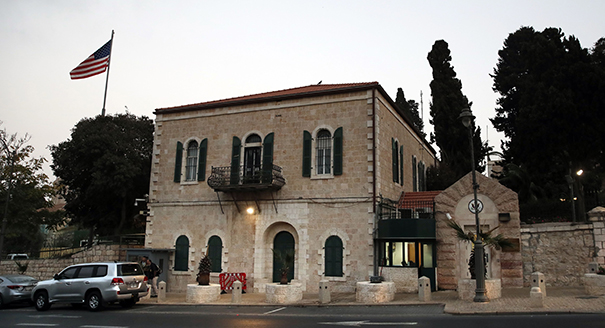The Trump administration’s decision on October 18 to close the U.S. Consulate General in Jerusalem, which largely worked with the Palestinians, was yet another harsh blow to hopes for peace between Israelis and Palestinians.
The consulate—an independent diplomatic mission in operation since the 19th century—had a unique status, playing a vital role in U.S. peace efforts over decades. Its closure will do real harm to U.S. interests. The administration disingenuously described the move as a “merger” with the embassy in Jerusalem to promote more “efficient” operations. In fact, it confirmed that the administration does not value a relationship with the Palestinians and prefers to view them as a subset of its relations with Israel. For those of us who served in the consulate over the years—I was consul general from 2005 to 2009 and deputy principal officer from 1996 to 1998—it is a sad end for a venerable institution.
The consulate was established in 1844, when Jerusalem was part of the Ottoman Empire, and it continued to function under the British Mandate for Palestine. When Israel was established in 1948, the city was divided between an Israeli-controlled west and a Jordanian-controlled east. The consulate continued to operate after 1948 as a single mission from two buildings—one in each half of Jerusalem—with U.S. officials travelling across the Mandelbaum Gate checkpoint as required. The consulate operated independently from the U.S. embassy to Israel in Tel Aviv and the embassy to Jordan in Amman.
After the June 1967 war, when Israel took control of all of Jerusalem, the consulate continued to function as before, from buildings in both the eastern and western parts of the city. With U.S. officials now able to travel more freely, the consulate gradually expanded its role beyond traditional consular functions to report on political and economic developments in Jerusalem and the West Bank.
As efforts to promote peace advanced in the 1980s and 1990s, the consul general and his team developed productive relationships with the Palestinian delegates who participated in the Madrid Peace Conference of 1991 and in the direct negotiations with Israel that followed. When the Oslo Accords led to the establishment of the Palestinian Authority, the consul general was designated by the State Department to maintain an ongoing policy dialogue with the Palestinian leadership. After 2002, when then-president George W. Bush adopted a position favoring a two-state solution, the consulate gained additional responsibilities for promoting Palestinian institution-building, overseeing a security assistance program and reporting on Gaza as well as the West Bank.
The independent status of the consulate was significant for two reasons. First, an independent U.S. mission in Jerusalem symbolized Washinton’s position held since 1948 that the final status of the city was to be resolved in negotiations between the parties. Second, as peace efforts evolved toward the goal of a two-state solution, an independent consulate was necessary to conduct a bilateral relationship with the Palestinians separate from U.S. ties with Israel. This distinct relationship with the Palestinians reflected Washington’s view that the only enduring solution to the conflict required the acceptance of separate nation states for Israelis and Palestinians.
The Trump administration, however, has chosen to depart from these policies. It decided last December to recognize Jerusalem as Israel’s capital and to establish the new U.S. embassy there, in that way seeking to resolve the issue of Jerusalem outside negotiations between the parties. And when the Palestinians reacted negatively to this approach, the administration punished them by cutting assistance and closing the mission of the Palestine Liberation Organization in Washington. In this context, the consulate’s status was diminished and its days as an independent mission were numbered.
However, the consulate played a vital practical role in advancing a two-state solution. Under the Bush and Obama administrations, the United States undertook concerted efforts to prepare the Palestinian Authority (PA) for the responsibilities of running a state that would serve the Palestinian people and live in peace with Israel. The Palestinians needed help in building governmental institutions and developing accountable security forces. The consulate played a key role in organizing and coordinating these multifaceted efforts on a day-to-day basis, with considerable help from the U.S. Agency for International Development and the U.S. security coordinator’s team. The consulate was also essential in building political support for such steps from the Palestinian leadership.
Unfortunately, the Trump administration has shown little interest in a two-state solution, and by cutting off civilian assistance to the PA and closing the consulate it has made practical U.S. support for Palestinian institution-building impossible. Washington may pursue the security assistance program for the Palestinians—something that also benefits Israel—but it is difficult to see how this can continue as a stand-alone activity without the clear objective of a two-state solution or the political cover provided by an independent consulate.
With the Trump administration’s sharp departure from its predecessors’ approach to Middle East peace-making, the consulate’s demise was inevitable. But transforming a robust consulate into a “Palestinian Affairs Unit” within the U.S. Embassy to Israel, as the administration decided to do, was not about “efficiency.” Rather, it was a policy decision to downgrade the status of the Palestinians—yet another nail in the coffin of an already moribund peace process.
The closure of the consulate, along with the changes in U.S. policy on Jerusalem’s status and the location of the embassy, cannot realistically be undone. Some day the United States may once again want to play an active role in promoting peace between Israel and the Palestinians. The Israeli government may even want American to help in this regard. Sadly, however, the actions of the administration will make it impossible for Washington to take on an effective peacemaking role for the foreseeable future. That is not in the interest of the United States, the Palestinians, or for that matter Israel.






